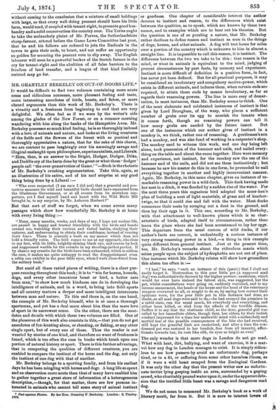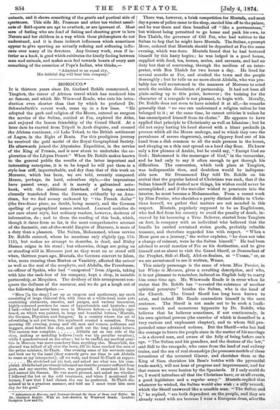MR. GRANTLE Y BERKELEY ON OUT-OF-DOORS LIFE.* IT would be
difficult to find two volumes containing more acute sense and ridiculous nonsense, more pleasant feeling and taste, more interesting anecdotes of birds, beasts, and fishes, or more absurd arguments than this work of Mr. Berkeley's. There is a vivacity and a freshness from beginning to end that are very delightful. We often feel as if we were by the writer's side among the glades of the New Forest, or on a summer morning wandering with him along the banks of the Hampshire Avon. Mr. Berkeley possesses so much kind feeling, be is so thoroughly imbued with a love of animals and nature, and looks at the living creatures of the fields and the flowers of the forest with so poetical and thoroughly appreciative a nature, that for the sake of this charm, we are content to pass laughingly over his amusingly savage and illogical onslaught upon philosophers, experimentalists, and Liberals. "Here, then, is an answer to the Bright, lodger, Dodger, Dilks, and Doddle cry of the harm done by the great or what these 'dodger' people call the over-preservation of Game.' "—Such is the rhetoric of Mr. Berkeley's crushing argumentation. Take this, again, as an illustration of his satire, and of his naïf surprise at any good thing being done by a Liberal :—
" Who ever suspected (I am sure I did not) that a graceful and pro- tective measure for wild and beautiful birds should have emanated from the Gladstone Government, or at all events from its mistaken sup- porters, yet I find myself hand and heart with the Wild Birds Bill brought in, to my surprise, by Mr. Auberon Herbert?"
But that sort of stuff we forget, when we come across many passages which show how wonderfully Mr. Berkeley is at home with every living thing :—
" Many, many months, weeks, and days of my, I hope not useless life, are passed in happy and trusted friendship with the birds and beasts around me, watching their curious and varied habits, studying their natures, and endeavouring to obtain their confidence, instead of rousing their fears. There is scarcely a bush on my manor which does not hold a friendly robin. The bird comes to me at my approach, sits close to my foot, with its little, brightly shining black eye, and craves by look and suppressed warble for the crumbs in my shooting-jacket pocket. If by chance my crumbs for the birds have been exhausted, which is seldom the case, it makes me quite unhappy to read the disappointment even a robin can exhibit in the poor little eyes, when I walk close-fisted from the solitary bush."
But amid all these varied pieces of writing, there is a clear pur- pose running throughout this book ; it is to "win for horses, hounds, dogs, and every other innoxious beast or bird, a better care from man," to show how much kindness can do in developing the intelligence of animals, and in a word, to bring into field-sports and all country matters a deeper and more intelligent intercourse between man and nature. To this end there is, on the one hand, the example of Mr. Berkeley himself, who is at once a thorough sportsman, and yet has a deal more about him than the mere love of sport in its narrowest sense. On the other, there are the anec- dotes and details with which these two volumes are filled. One of the pleasures of this work also consists in this,—that you do not get anecdotes of fox-hunting alone, or shooting, or fishing, or any other single sport, but of every one of these. Thus the reader is not wearied by stories of one kind, and therefore no want of freshness is found, which is too often the case in books which touch upon one portion of natural history or sport. There is this further advantage, that in comparing the qualities of different creatures, you are enabled to compare the instinct of the horse and the dog, not only the instinct of one dog with that of another.
Mr. Berkeley belongs to a sporting family, and from his earliest days he has been mingling with horses and doge. A long life so spent and an observation more acute than that of many have enabled him to gather together a great store of information of a heterogeneous description,—though, for that matter, there are few persons in- terested in animals who cannot tell some story of animal instinct
* Fact against Fiction. By the Hon. Grantley F. Berkeley. London : S. Tinsley. 1874.
or goodness. One chapter of considerable interest the author devotes to instinct and reason, to the differences which exist between the qualities, so to speak, which are known by these two names, and to examples which are to bear out his theories. But. the question is one of so puzzling a nature, that Mr. Berkeley rather declines to define reason and instinct as seen in the doings. of dogs, horses, and other animals. A dog will trot home for miles over a portion of the country which is unknown to him in almost a straight line. It is impossible to call this reason, it is instinct. The difference between the two we take to be this : that reason is the mind, or what in animals is equivalent to the mind, judging of present circumstances by past facts, by memory and experience. Instinct is more difficult of definition in a positive form, in fact, has never yet been defined. But for all practical purposes, it may be considered an involuntary and compulsory motive-power, which exists in different animals, and induces them, when certain ends are required, to attain those ends by means involuntary, as far as regards their reasoning powers. The line is more easy of demar- cation, in most instances, than Mr. Berkeley seems to think. One of the most elaborate and celebrated instances of instinct is that given by Lord Brougham, of the wasp, who places a sufficient number of grubs over its egg to nourish the inmate when, it comes forth, though no reasoning powers can tell it how many grubs are needed by the future insect. But one of the instances which our author gives of instinct in a. monkey is, we think, rather one of reasoning. A gentleman's son had a monkey, and was also fond of working in a carpenter's shop. The monkey used to witness this work, and one day being left alone, took possession of the hammer and nails, and nailed every- thing on the table and about the room together. Here were memory and experience, not instinct, for the monkey saw the use of the hammer and of the nails, and did not see them instinctively ; but because he saw his master do this in one form, he proceeded to nail everything together in another and highly inconvenient manner. Again, Mr. Berkeley, in this same chapter, gives an instance of re- markable reasoning power in a wild duck. This duck having made her nest in a ditch, it was flooded by a sudden rise of the water. For the next three years this sagacious bird adopted the moor-hen's plan of building a nest of light materials, of grass and of heather- twigs, so that it could rise and fall with the water. Most ducks commence their nests by scraping out a dent in the ground, and then lay their eggs in it. This one, according to Mr. Berkeley, with that attachment to well-known places which is so char- acteristic of birds, adapted itself to circumstances, rather than leave the place where she had been accustomed to lay her eggs. This departure from the usual custom of wild ducks, if our author's facts are correct, is undoubtedly a curious instance of very strong reasoning power in a bird,—a thing in this example quite different from general instinct. Just at the present time, too, Mr. Berkeley's remarks about the ridiculous mania which seizes people upon the subject of hydrophobia are not out of place. One instance which Mr. Berkeley relates will show how groundless this alarm too often is :—
" I had," he says, "such an instance of this (panic) that I shall not easily forget it. Destruction to this poor little pet (a supposed mad dog) was authoritatively decreed by the higher powers : cauterism, which would for ever have stained the fairest skin, was suggested, but the pet, whilst consultations were going on, suddenly vanished, and to my intense amusement, the heads of the house and the head of the veterinary surgeon overawed us all, or sought to do so, by saying how correct their opinions wore, for the poor little pet in this instance had done, no, doubt, as all mad dogs wore said to do,—he had escaped the premises in a rabid state, run the usual muck, bit everybody and everything, and either been killed, or died from the effects of the terrible disease. Suffice it to say that the obstinate child, as the dear, graceful girl was called by her immediate elders, though they, her elders, by their foolish conduct impressed for a time her malleable mind with a melancholy and morbid fear of the possible consequences of the bite she had received, still kept the graceful limb not cauterised, and after a time the con- demned pet was restored to her boudoir, free from all insanity, affec- tionate towards her, its coat like silk, its eyes as bright as ever."
The only wonder is that more dogs in London do not go mad.. What with heat, dirt, bullying, and want of exercise, it is a mar- vel how any dog in London manages to exist. It is simply ridicu- lous to see how passers-by avoid an unfortunate dog, perhaps tired, or in a fit, or suffering from some other harmless illness, as if it were a wild beast escaped from the Zoological Gardens. It was only the other day that the present writer saw an unfortu- nate terrier lying gasping inside an area, surrounded by a gaping crowd, who charitably poured water upon it, under the apparent delu- sion that the terrified little beast was a savage and dangerous mad dog.
We do not mean to commend Mr. Berkeley's book as a work of literary merit, far from it. But it is sure to interest lovers of
animals, and it shows something of the gentle and poetical side of sportsmen. This side Mr. Freeman and other too violent email- ants of field-sports are apt to overlook, or are ignorant of. Most men of feeling who are fond of fishing and shooting grow to love Nature and her children in a way which thew philosophers do not understand, and it is these indirect influences which sometimes appear to give sporting an actually refining and softening influ- ence over many of its devotees. Any literary work, even if in- ferior as a book, is good which cultivates the kindly feeling between man and animals, and makes men feel towards beasts of every sort something of the sensation of Pope's Indian, who thinks,—
" Admitted to an equal sky,
His faithful dog will boar him company."



































 Previous page
Previous page